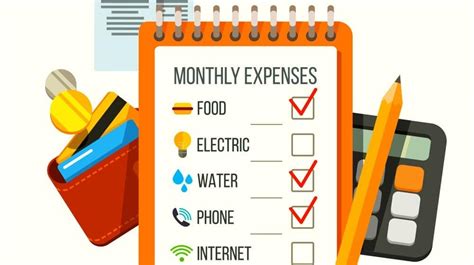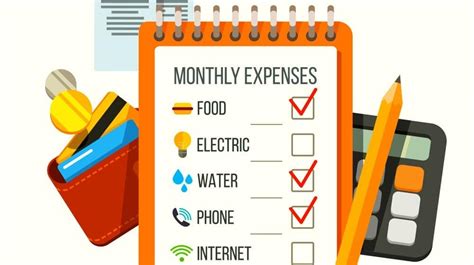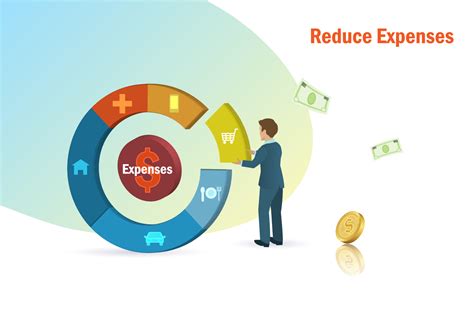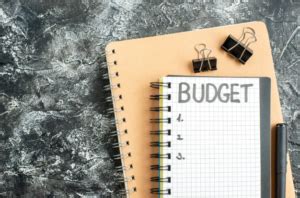In today's modern world, managing one's finances has become more important than ever. Whether you're a student, a young professional, or a family looking to meet their financial goals, it all boils down to one thing - budgeting. A well-crafted budget allows you to take control of your finances, avoid debt, and ultimately achieve your dreams. However, creating an effective personal budget is easier said than done.
Creating a personal budget is about more than just crunching numbers and making calculations. It requires a careful analysis of your income, expenses, and financial goals. It involves making tough decisions about your spending habits and identifying areas where you can cut back or save. But fear not, for we are here to guide you on this journey towards financial success.
On this insightful journey, we will explore various strategies and techniques that can help you create a budget that works for you. From understanding the importance of setting SMART financial goals to prioritizing your needs and wants, we will delve into the nitty-gritty details of personal budgeting. We will explore the art of tracking your expenses, distinguishing between fixed and variable costs, and uncovering the hidden leaks in your wallet.
But be warned, creating a personal budget requires discipline and dedication. It is not a quick-fix solution but rather a lifelong habit that requires regular reviewing and fine-tuning. However, the rewards are well worth the effort. By mastering the art of financial planning, you will be able to enjoy a stress-free life, free from the burden of debt, and full of endless opportunities to pursue your passions and dreams.
Understanding Your Income and Expenses

In order to effectively manage your finances, it is crucial to have a thorough understanding of your income and expenses. By gaining insight into your financial situation, you can make informed decisions and create a budget that aligns with your goals.
One of the first steps in understanding your income and expenses is to track and categorize your sources of income. This includes your salary or wages, any side jobs or freelance work, rental income, investment returns, and any other money that comes into your bank account. By identifying all sources of income, you can establish a clear picture of how much money you have available to allocate towards your expenses.
Next, it is important to accurately identify and categorize your expenses. Start by listing your fixed expenses such as rent or mortgage payments, utility bills, insurance premiums, and loan repayments. These are expenses that stay relatively consistent from month to month.
Once you have accounted for your fixed expenses, it is time to identify your variable expenses. These are expenses that may fluctuate from month to month, such as groceries, dining out, transportation, entertainment, and personal care products. Tracking your variable expenses can help you identify areas where you might have the opportunity to cut back and save money.
Alongside your income and expenses, it is important to consider any outstanding debts or financial obligations. This includes credit card debt, student loans, car loans, and any other loans or lines of credit. By understanding your debt and repayment obligations, you can factor them into your budget and prioritize paying them off in a timely manner.
- Track and categorize all sources of income
- Identify fixed expenses
- Identify variable expenses
- Consider outstanding debts and financial obligations
By taking the time to understand your income and expenses in detail, you can gain control over your finances and make informed decisions about how to allocate your money. This understanding will provide a solid foundation for creating an effective personal budget that helps you achieve your financial goals.
Set Clear Financial Objectives
Establishing well-defined financial goals is crucial for successful budgeting. By clearly identifying your objectives, you can strategically plan and manage your finances to achieve them.
When setting financial goals, it is important to consider both short-term and long-term objectives. Short-term goals could include saving for a vacation or purchasing a new gadget, while long-term goals might involve saving for a down payment on a house or planning for retirement.
Having clear financial objectives provides you with a sense of direction and purpose when managing your budget. It helps you prioritize your spending, make informed decisions, and stay motivated to consistently save and invest for the future.
Moreover, setting specific, measurable, achievable, relevant, and time-bound (SMART) goals can significantly increase your chances of success. SMART goals provide a framework for planning and tracking your progress, making it easier to stay on track and adjust your budget as needed.
Remember, setting clear financial goals is the first step towards creating an effective personal budget. Take the time to reflect on your aspirations, and then use them as a guiding force to make wise financial decisions that align with your goals.
Monitor Your Expenses

One crucial aspect of effectively managing your personal finances is closely tracking your spending. By keeping a watchful eye on where your money goes, you can gain a better understanding of your financial habits and identify areas where you can make adjustments to achieve your budgeting goals.
- Record your expenditures: It is essential to diligently record every purchase you make, no matter how small. This can be done through various methods, such as using a mobile app, creating a spreadsheet, or keeping handwritten notes. The key is to find a method that works best for you and allows you to easily access and review your spending data.
- Categorize your expenses: To gain a comprehensive overview of your spending patterns, it is helpful to categorize your expenses. This can be done by grouping similar items together, such as housing costs, transportation expenses, groceries, entertainment, and so on. Having clear categories will enable you to identify areas where you may be overspending and make informed decisions about where to cut back.
- Set spending limits: Once you have a clear understanding of your spending habits, it is crucial to set realistic spending limits in each category. This will help you prioritize your expenses and ensure that you allocate your money according to your financial goals. Setting limits also provides a sense of control and prevents impulsive purchasing decisions.
- Track your progress: Continuously monitoring your spending and comparing it against your budget allows you to track your progress and make necessary adjustments along the way. This will help you stay accountable to your financial goals and identify any areas where you may need to tighten your spending or reallocate funds.
By consistently tracking your expenses and analyzing your spending patterns, you will gain greater control over your financial situation and be able to make more deliberate decisions about how to effectively manage your personal budget.
Prioritize Your Needs and Wants
In order to create an effective personal budget, it is important to prioritize your necessities and desires. By understanding and categorizing your needs and wants, you can make informed decisions about where to allocate your financial resources.
Identifying your needs: Start by identifying your essential needs, or the things that are necessary for your survival and well-being. These might include expenses such as rent or mortgage payments, utilities, groceries, and transportation. Prioritizing these needs ensures that you can cover your basic living expenses.
Distinguishing your wants: Once you have identified and prioritized your needs, it is essential to distinguish your wants, or the non-essential items and experiences that you desire but can live without. These might include eating out at restaurants, going on vacations, or purchasing luxury items. Prioritizing your wants allows you to be mindful of your spending habits and make conscious choices about where to allocate your discretionary income.
Creating a balance: Balancing your needs and wants is crucial for creating a sustainable personal budget. While it is important to fulfill your needs, it is also important to allocate some funds towards your wants to maintain a healthy level of happiness and satisfaction. By understanding the difference between your needs and wants, you can effectively prioritize your spending and ensure that your financial resources are being used in a way that aligns with your values and goals.
Making adjustments: It is important to regularly review and reassess your needs and wants as your financial situation and priorities may change over time. Adjusting your budget allows you to stay on track and make necessary modifications to meet your evolving needs and desires.
By prioritizing your needs and wants, you can create an effective personal budget that allows you to allocate your financial resources wisely and work towards your financial goals. Understanding the distinction between needs and wants is the first step towards making informed financial decisions and achieving financial stability.
Reduce Unnecessary Expenses

Minimize superfluous spending and maximize savings by cutting down on unnecessary expenses.
One effective strategy for managing your personal finances is to identify and eliminate unnecessary expenditures. By examining your budget closely, you can identify areas where you may be overspending or wasting money. This will enable you to make conscious decisions about your spending habits and prioritize essential expenses over non-essential ones.
Start by distinguishing between needs and wants. While it is important to fulfill your basic needs, such as food, shelter, and healthcare, it is equally crucial to distinguish between essential and non-essential wants. For example, dining out frequently or buying designer clothes may be enjoyable, but they are not essential for your survival or well-being. Identifying and reducing these non-essential wants can significantly impact your budget in a positive way.
Another way to cut down on unnecessary expenses is to track your daily spending. Keep a record of all your expenses, including small purchases, for at least a month. This will help you identify any patterns or recurring expenses that you can eliminate or reduce. By being mindful of your spending habits and making small adjustments, such as bringing lunch from home instead of eating out, or brewing your own coffee instead of buying it at a coffee shop, you can save a significant amount of money in the long run.
Furthermore, consider negotiating or seeking alternatives for recurring expenses such as utility bills, insurance premiums, or subscription services. Many providers offer discounts or better deals if you inquire or compare prices. By taking the time to research and negotiate, you can potentially save money each month.
In conclusion, cutting down on unnecessary expenses is a vital step toward creating an effective personal budget. By distinguishing needs from wants, tracking your spending, and negotiating recurring expenses, you can make significant progress in optimizing your finances and reaching your financial goals.
Create a Realistic Budget Plan
Developing an achievable financial strategy is fundamental to maintaining a stable and secure financial future. Crafting a realistic budget plan is an essential part of this process, as it allows individuals to effectively manage their income and expenditures while achieving their financial objectives.
1. Assess Your Income and Expenses: Begin by thoroughly examining your sources of income and categorizing your expenditures. This evaluation will provide a clear understanding of how much money you have available to allocate towards different expense categories.
2. Prioritize Your Financial Goals: It is crucial to identify your short-term and long-term financial goals. This will guide you in determining the appropriate allocation of funds to each goal and help you prioritize your spending accordingly.
3. Track Your Spending: To create a realistic budget plan, it is essential to track your spending habits. Keep a record of every transaction you make, whether it is a purchase, bill payment, or any other expense. This will provide valuable insights into your spending patterns and assist in making adjustments as needed.
4. Differentiate between Needs and Wants: Distinguishing between your needs and wants is a crucial step in establishing a realistic budget. While needs are essential expenses required for basic living, wants encompass discretionary spending. Prioritize your needs and allocate funds accordingly, keeping in mind that excessive spending on wants may hinder your financial goals.
5. Account for Unexpected Expenses: It is important to consider unforeseen expenses when creating a budget plan. Set aside a portion of your income for emergencies or unexpected events to avoid financial stress and maintain financial stability.
6. Review and Adjust Regularly: A realistic budget plan is a flexible tool that requires regular review and adjustment. Analyze your budget periodically to ensure it aligns with your current financial situation and make necessary modifications to achieve your financial goals effectively.
By following these guidelines and creating a realistic budget plan, you can take control of your finances and make informed decisions that contribute to your long-term financial success.
Monitor and Adjust Your Budget Regularly

Keeping a close eye on your finances and making necessary changes to your budget as needed is a crucial step in effectively managing your personal finances. Consistently monitoring and adjusting your budget allows you to stay in control of your money and ensure you are making the most of your financial resources.
Regularly reviewing your budget helps you track your income and expenses, identify any patterns or trends, and make informed decisions about where to allocate your funds. By analyzing your spending habits and income sources, you can identify areas where you may be overspending or areas where you can potentially save more money.
- Review your budget monthly or quarterly to assess your financial progress. Look for any discrepancies or unexpected expenses that may have occurred.
- Consider using budgeting apps or online tools to simplify the tracking and monitoring process. These tools can help automate the process and provide you with real-time updates on your financial status.
- Adjust your budget as needed to accommodate any changes in income or expenses. Life circumstances can change, and it's important to adapt your budget accordingly to ensure it remains relevant and effective.
- Set specific financial goals and track your progress towards them. This will help motivate you to stick to your budget and make necessary adjustments to achieve your objectives.
- Keep records of your past budgets and refer back to them periodically. This will allow you to compare your current budget to previous ones and see how your financial situation has evolved over time.
Remember, a budget is a flexible tool that should be regularly reassessed and adjusted based on your financial goals and priorities. By consistently monitoring and adjusting your budget, you can maintain financial stability and work towards building a strong financial future.
Get Expert Financial Guidance if Necessary
When it comes to managing your personal finances, it's crucial to make informed decisions that align with your goals and circumstances. While creating an effective budget is a great start, there may be situations where seeking professional financial advice can provide valuable insights and guidance.
Considering the complexity of financial matters, it's understandable that you may encounter challenges or questions during the budgeting process. If you find yourself struggling to make sense of certain aspects or if you want to optimize your budget further, consulting with a financial expert can help to ensure that your budget is tailored to your specific needs.
Financial advisors have the knowledge and expertise to analyze your financial situation comprehensively. They can offer personalized recommendations, help you understand complex investment options, and provide insights into strategies to reach your financial goals efficiently. Whether you're planning for retirement, saving for a major purchase, or dealing with a significant life event, a professional advisor can provide valuable insights and advice specific to your circumstances.
Additionally, seeking professional financial advice can help you avoid potential pitfalls and better understand the potential risks associated with your budgeting decisions. An expert can analyze your income, expenses, and financial goals to identify areas where adjustments may be necessary or where you might be overlooking critical factors.
It's important to note that seeking professional financial advice doesn't imply a lack of personal capability or understanding. Instead, it demonstrates your commitment to making well-informed financial decisions and maximizing the potential of your budget. By seeking expert guidance, you can gain a fresh perspective, explore new possibilities, and make more informed choices for your financial future.
- Consider consulting with a financial advisor to optimize your budget.
- Financial experts offer personalized recommendations for your specific needs.
- Professional advice helps you understand complex investment options.
- A financial advisor can provide insights into efficient strategies for reaching your goals.
- Expert guidance helps you avoid potential pitfalls and understand risks.
FAQ
What is a personal budget?
A personal budget is a financial plan that helps individuals track their income and expenses to achieve their financial goals.
Why is it important to create a personal budget?
Creating a personal budget is important because it allows you to gain control over your finances, track your spending habits, and ensure that your income is being allocated effectively towards your financial goals.
What are the key steps in creating an effective personal budget?
The key steps in creating an effective personal budget include: 1) determining your income, 2) tracking your expenses, 3) setting financial goals, 4) prioritizing your expenses, 5) creating a budget plan, and 6) regularly reviewing and adjusting your budget.
How can I track my expenses effectively?
You can track your expenses effectively by using budgeting apps or software, keeping receipts and records of all your purchases, categorizing your expenses, and regularly reviewing your financial transactions.
What are some common budgeting mistakes to avoid?
Some common budgeting mistakes to avoid include: 1) underestimating expenses, 2) not saving for emergencies, 3) not adjusting the budget when necessary, 4) overspending on unnecessary items, and 5) not keeping track of small daily expenses.



